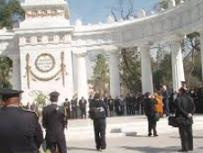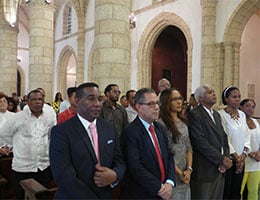 The notion of commemoration refers to the act and result of commemorating : celebrating an anniversary , remembering someone or something in a solemn way. The term derives from the Latin word commemoratio .
The notion of commemoration refers to the act and result of commemorating : celebrating an anniversary , remembering someone or something in a solemn way. The term derives from the Latin word commemoratio .
For example: “The president led the commemoration of Army Day,” “In commemoration of the bicentennial of independence, next month an exhibition will be inaugurated at the National Historical Museum,” “It is still unknown when the commemoration event will be held.” ” .
Commemorations are usually carried out to keep alive the memory of certain historical events. The death of a hero, a battle or a terrorist attack can be commemorated: it is important to keep in mind that the commemoration is not a celebration, but rather consists of remembering what happened.
Many times the commemoration has the objective of renewing a demand for justice . When a terrorist attack is commemorated, to cite one case, the intention is that the population does not forget the victims and that those responsible for the attack are convicted. In Argentina , every July 18, a commemoration event is held for the attack on the Argentine Israelite Mutual Association ( AMIA ), which took place in 1994 .
There are commemorations that are international and are usually linked to anniversaries recognized by the United Nations ( UN ). One such commemoration is International Workers' Day , which is commemorated every May 1 in honor of a group of trade unionists who were executed in the United States for demanding improvements in labor rights.
In the field of Catholicism , commemoration is known as the memory that, in a liturgy , is performed of a saint within the framework of a celebration that has a higher rank. The commemoration can take place through a prayer or some type of ceremony.
Let us not forget that the concept of prayer has a particular meaning in religion, different from what it receives in grammar: it is the action through which religious people can establish communication with a saint or with God himself. The objective of prayer can be to make a request, offer your respect or share your emotions and thoughts, as if it were a conversation with an elder who offers you refuge and support.
 Before their death, some Catholics leave a written will with their last will, expressing their wish that a certain number of masses be held in their memory, or that they be commemorated in prayers.
Before their death, some Catholics leave a written will with their last will, expressing their wish that a certain number of masses be held in their memory, or that they be commemorated in prayers.
On the other hand, while the breviary (book of the religious liturgy of Catholicism that brings together in an abbreviated form the public obligations of the clergy each day of the year) is prayed, Catholicism also calls commemoration the memory that is made of a saint, or to the fair through an antiphon (a musical form present in the traditions of Christianity), a prayer or a verse, with the possibility of including a collect and a text recited or sung after Communion.
The holiday known as Commemoration of the Faithful Departed , Day of the Dead or Day of the Dead , takes place on November 2 to remember the faithful who have lost their lives in the name of religion . The abbot of Cluny, Saint Odilon, began to celebrate it in the 11th century.
On the other hand is the Commemoration of the Martyrs , a custom that the Catholic Church has maintained since its beginnings to honor the lives of those who have endured persecution and violence because of their beliefs. The intention of this commemoration is that the lives of the martyrs have not been lost in vain, but that their dedication serves as an example for the rest of the faithful.
